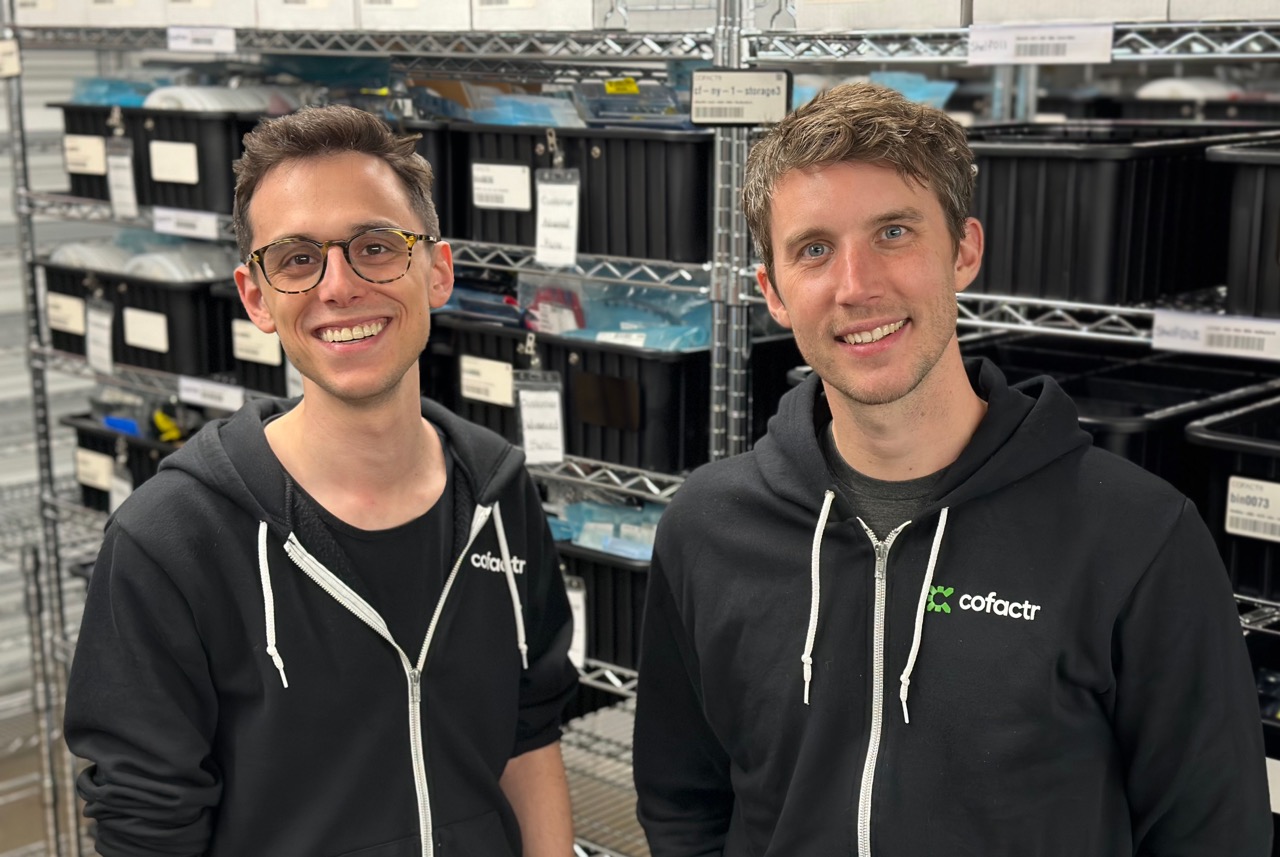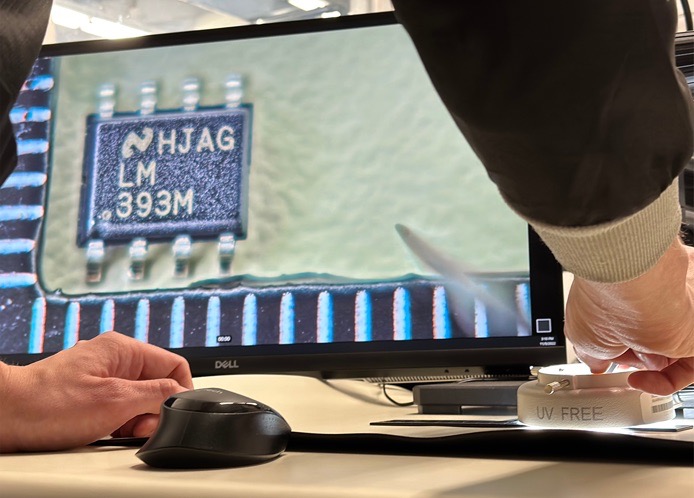Cofactr is a logistics and supply chain tech company that provides scalable warehousing and procurement for electronics manufacturers. The company today announced it raised a $6 million round of seed funding, to “lead the next generation of agile hardware materials management.” The company raised on a SAFE note with a $25 million cap. We spoke to the company’s team to learn more about its vision of the future.
Cofactr addresses a suite of challenges for electronics producers through pre-manufacturing, third-party logistics services and supply chain automation. By providing these products as a unified strategic solution, the goal is to enable hardware manufacturers the ability to get to production volume without investing in the specialized facilities or headcount historically needed to manage electronic components.
“Both Phil [Gulley, the company’s CRO and co-founder] and I are driven by the desire to solve problems. Before Cofactr, we were working on the engineering and solutions side of hardware with our previous company, BeSide Digital, starting off in the entertainment industry and growing to support companies like Zoox, Google and CrowdStrike across product and custom hardware for marketing,” said Matthew Haber, co-founder and CEO of Cofactr in an interview with TechCrunch. “A challenge we had, and saw reflected in the processes of our clients, was that building and scaling hardware felt incredibly laborious in comparison to software. After we sold BeSide, electronic supply chain and logistics was the biggest and most personal problem we could address.”
The passage of the CHIPS Act could launch another US startup renaissance
The company told me that the journey to Cofactr’s current state wasn’t entirely linear. The company initially built and ran a contract manufacturer for circuit board assembly, but realized that wasn’t the right context to tackle these problems. From there, the company evolved to build electronics-specific third-party logistics and procurement automation.
“Having worked in hardware and software we had the opportunity to experience both ecosystems and knew how easy things could be when technology bridges gaps between ideas and scale,” said Gulley. “That was the insight that Cofactr was born out of. It’s the company we wished existed when we were on the engineering side of the table.”

The investment round was led by Bain Capital Ventures with participation from Y Combinator, Broom Ventures, Cathexis Ventures, Sweet Spot Capital, Pioneer Fund, Seed River, Litani Ventures, Correlation Ventures and a few angel investors.
“The big players on the cap table are Bain Capital Ventures (BCV) and Y Combinator. YC helped us focus on finding and providing the things that people really loved about Cofactr and set us up to meet Ajay Agarwal at BCV, which immediately felt like a match. The BCV team understood the opportunities that can come out of a business that integrates hardware, logistics and software into a single solution, as well as the challenges that come with building in many areas simultaneously,” says Gulley.
The next wave of supply-chain innovation will be driven by startups that help incumbents win
The investors, in turn, see a future where the Cofactr team can put a dent in how electronics are manufactured.
“When we first met Cofactr founders, I was really impressed with their understanding of the challenges of electronic component procurement. We’ve never seen anything similar to the integrated software and logistics system they’ve built. It combines cloud procurement software, a network of suppliers and a turn-key logistics platform that handles shipping, customs management, counterfeit insurance, inventory, kitting and shipping management,” says Agarwal, partner at BCV, in an interview with TechCrunch. “With the Cofactr platform, hardware manufacturers can find electronic components, check pricing, order parts, handle replenishment and send parts to their partner manufacturers. Behind the scenes, Cofactr handles everything including the acquisition of the parts, storage and management of the inventory, control checks to ensure the inventory is not counterfeit and regular shipments of components to manufacturers.”
Cofactr appears to represent a continuation of BCV’s focus on logistics and supply chain. The investor has backed companies such as Kiva Systems (robotic fulfillment sold to Amazon); FourKites (supply chain visibility — which raised $30 million back in August); ShipBob (cloud fulfillment for e-commerce brands); TruckSmarter (mobile app to allow freight drivers to find and book their next load) and now Cofactr. In addition, it made an investment in Flux, which operates in a similar space, last year.
Of course, the pandemic, in particular, exposed many cracks in the supply chain. Ford, for example, warned its investors that it had to eat an additional $1 billion of costs in Q3 this year, largely due to supply chain challenges, and GM saw a 40% drop in profits in Q2 this year. It ain’t pretty out there, but that’s the fertile ground in which supply chain startups get to sow their opportunities.
Why Ford will have to eat an extra $1B in supplier costs this quarter
“Electronics components were particularly hard to come by. That meant a lot of challenges for hardware companies, whether they’re building dishwashers, robots or smart speakers. In a handful of industries, we think there is an opportunity to create a vertically integrated software and logistics solution,” Agarwal explains. “A good example of this is ShipBob and what they built for mid-market e-commerce brands. Cofactr is doing this for procurement of electronic components, with a complete software-and-logistics solution for hardware manufacturers.”
The ultimate goal for Cofactr is to make hardware not-so-hard, the founders quip.
“There is starting to be a real groundswell of startups attacking the hardware engineering space, but we all have to interconnect and work together in the same way that software development tools do. You’ll be seeing more collaboration between Cofactr, other startups and well-established organizations that serve hardware,” says Gulley. “Fast-forward a few years and we see Cofactr as the cloud solution for pre-manufacturing infrastructure. Our vision feels something like the hardware manufacturing version of AWS; on-demand, cloud-based solutions for physical manufacturing. Today, companies can take a software product from MVP to massive scale without crippling infrastructure investments. In a decade, the same will be true for building hardware products and we believe that Cofactr will be a core enabler of that transformation.”
All of this makes a lot of sense in the context of the U.S. wanting to build a more reliable and resilient on-shore manufacturing capacity. The CHIPS act is making some real waves in the semiconductor industry, and there’s been a fair chunk of investment in logistics and electronics manufacturing in the past year. Last month, Makersite raised $18 million and Altana picked up $100 million.































Comment